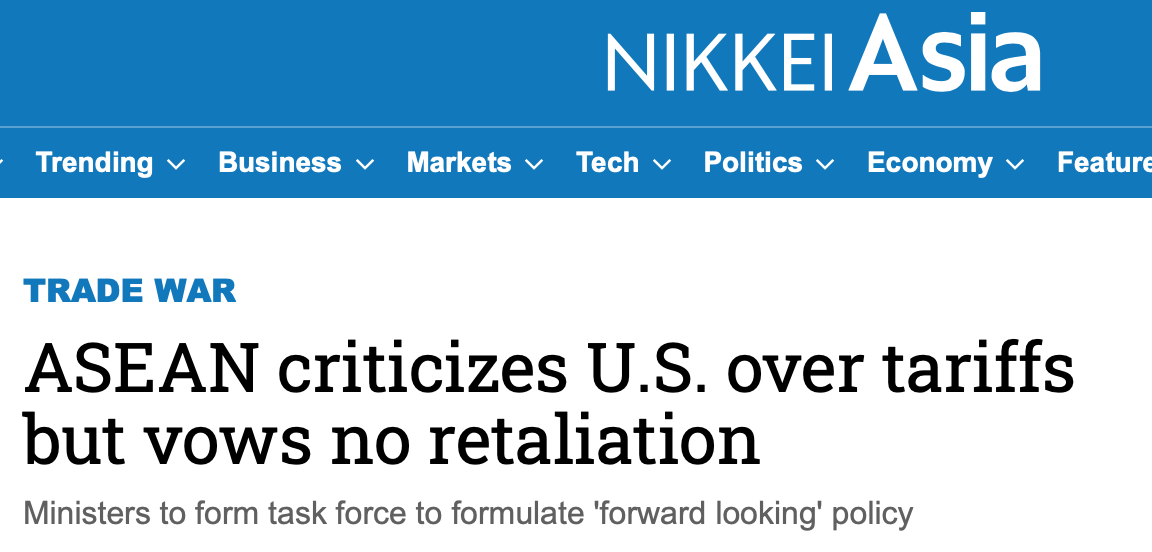As the 2024 campaign neared its end, candidate Donald Trump began promising that, if elected, he would support the elimination of income taxes. Shortly after he was sworn in, Trump then began saying he planned to abolish the Internal Revenue Service. The Trump team claimed in each case that it could raise enough tax revenue from tariffs to replace tax revenue from income taxes.
By March, however, Trump began backtracking, and his administration announced that the new goal was to eliminate income taxes for people making under $150,000 per year.
That last development on its own tells us that the IRS isn’t going away. If people making more than $150,000 are still going to pay income tax, then there will still be an IRS to which we’ll need to send tax returns to prove we’re not making more than $150,000.
But even if we ignore that problem, there are at least two other reasons why we can be sure the IRS isn’t going anywhere. The first way we know this is from the fact that the Trump administration is only talking about “abolishing” the progressive individual income tax. Administration mouthpieces have said nothing at all about getting rid of the income taxes known as the “payroll tax” that every wage earner pays.
The second way we know that the IRS isn’t going away is that taxes on imports—i.e., tariffs—simply aren’t going to bring in enough revenue to keep funding all the popular spending programs that Trump clearly has no interest in cutting.
Payroll Tax: The Income Taxes All Workers Pay
When politicians talk about “the income tax” they virtually always mean the progressive individual income tax. This tax is paid mostly by the top 50 percent of earners. The bottom fifty percent of earners pay an average income tax rate of 3.3 percent.
But there is another income tax paid by all wage earners, regardless of income level, and that is the payroll tax. There is a reason why politicians never mention this income tax: it is connected to the very popular welfare programs known as Social Security and Medicare. The Social Security tax in 2025 is 12.4 percent. The Medicare tax is an additional 2.9 percent. Half of this is paid by the employee and half is paid by the employer. Of course, the employee really pays for both halves because employers effectively reduce wages to pay the payroll tax.
The money collected from these taxes goes into the general fund, and not into any sort of “trust fund.” That means it’s simply an income tax that’s used to beef up federal revenues. It is true enough, though, that without this tax, it would be much harder for the federal government to collect enough revenue to keep Social Security and Medicare funded at its present levels. The feds need today’s workers to keep slaving away and paying the payroll tax so it can be handed over to today’s pensioners.
This is why politicians never talk about getting rid of the payroll tax. It would be political poison to suggest that one of the biggest sources of revenue for old-age welfare programs is going away. If politicians did this, ARRP-type activists would go nuts.
So, politicians aren’t likely to get rid of the payroll tax, and that means there needs to be a government agency to keep track of everyone’s wages and make sure that the tax gets collected. Which agency is that? Well, since 1937, it has been the Internal Revenue Service. As the IRS’s history page reads:
On August 14, 1935, Franklin D. Roosevelt signed the Social Security Act. Employees originally paid one percent of the first $3,000 of their salaries to finance the benefits. The law required a new system of tax withholding, which the Bureau of Internal Revenue had to collect… [emphasis added.]
By the way, my readers will probably not be shocked to learn that the payroll tax has increased over time. Like so many taxes, it started out “small” and then got a lot larger. In 1937, when it was introduced, the payroll tax was 2 percent:
Source: The Tax Policy Center.
Any payroll tax of any kind is going to require an agency to collect it and monitor earnings. That’s the IRS. It’s entirely possible that Trump might rename the IRS to something like “The Department of Making America Great Again” but whatever we might call it, it will just be some form of the IRS. So, until Trump and his spokespeople start talking explicitly about abolishing all taxes on income—and not just the progressive income tax—then we know he isn’t serious about getting rid of the IRS.
Tariff Revenue Won’t Match Income Tax Revenue
The second reason why the Trump administration is not really getting rid of all income taxes or the IRS is this: tariffs won’t bring in enough revenue to keep up with the federal government’s big spending plans.
As of 2024, “customs duties”—i.e., tariffs—made up two percent of all federal revenues. That includes the new tariffs put in place by Trump, and kept in place by Biden, in recent years. The total revenue is only $80 billion. While that’s two percent of all revenue, it’s only 1.2 percent of all federal spending. Remember that federal spending is far larger than federal revenues, and the federal government will likely run a deficit of at least two trillion this year alone.
In other words, the $80 billion in revenue produced by tariffs is a drop in the bucket.

Source: fiscaldata.treasury.gov.
In contrast, the progressive individual income tax brings in about 49 percent of all federal tax revenue. In addition, the payroll tax brings in 35 percent.
If Trump thinks he’ll replace all income taxes with tariff revenues, then he’ll need to increase tariff revenue from $80 billion to about $4.1 trillion. That is, Trump will have to find a way to increase tariff revenues by fifty-one fold.
That would just cover current revenue. If we want tariffs to actually eliminate the deficit, too—which is roughly two trillion more than tax revenue—tariff revenue will have to go up even more.
People who think this seems plausible might say things like “well Trump will get rid of the deficit and cut federal spending using DOGE.” People who say things like this are basically saying “I am bad at arithmetic.”
Currently, the best-case scenario offered by DOGE is that it wants to cut a mere $1 trillion in federal spending. This is almost certainly complete fantasy, but for the sake of argument let’s assume DOGE will be able to do that. This wouldn’t even eliminate the deficit overall, and the remaining deficit would still be more than a trillion dollars. That would mean that next year’s total for federal spending will still be about $5.7 trillion. To close the gap between revenue and spending, tariff revenue will need to increase by at least another trillion on top of all the other trillions necessary to replace income taxes. That means federal tax collectors will have to increase its current tariff revenue sixty times over.
So, can Trump just increase tariff rates by sixty fold? Some protectionists might love that, but it would also mean that people would stop buying imported goods. That means they’ll stop paying the tariffs, and tax revenue will plummet, but so would the standard of living. Even as revenues fell, though, most Americans would continue to demand all the usual spending. We know from survey data that federal spending is very popular. Given this fact, politicians wouldn’t dare cut military spending or Social Security spending, and Federal deficits would skyrocket. The central bank, the Federal Reserve, would have to start buying up Treasurys to keep interest rates from running sky-high. This would mean more money printing and high levels of inflation.
America’s federal politicians aren’t willing to risk any of that. Again, they won’t even talk about getting rid of the payroll tax because that brings up the issue of cuts to Social Security. Politicians want to keep spending at current levels, and politicians know that price inflation is very unpopular with the voters.
All this adds up to a virtual guarantee that Trump and his allies have no plans to get rid of the IRS or even all income taxes. Until the voters start demanding big federal spending cuts, and stop saying things like “hands off Medicare,” the politicians have every incentive to keep the federal spending machine humming at levels far above what tariff revenue is likely to fund.




























